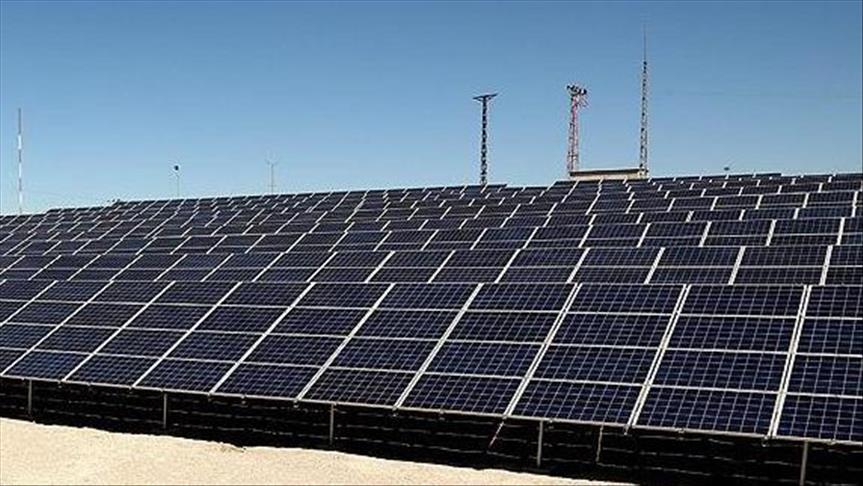
By Felix Nkambeh Tih and Esma Ben Said
TUNIS, Tunisia
From Ghana to South Africa, from Kenya to Benin to Ivory Coast, access to electricity has become a priority.
Over 600 million of the 1.1 billion people in Africa have no access to electricity, according to Alexandre Castel president of Station Energy.
“Energy is a major issue for the African continent, because someone who does not have access to energy, cannot have access to health, telecommunications or education,” Castel told Anadolu Agency on Wednesday.
Station Energy designs and develops innovative systems and infrastructure for access to energy and other basic services in West Africa (Burkina Faso, Ivory Coast, Senegal).
Castel added that Africa needs a multitude of eco-infrastructure projects, including solar systems for cold rooms, which will preserve crops, in a continent that lose over 40 percent of its agricultural production because of lack of adequate storage and facilities.
In 2013 green energy (solar, hydro, wind etc.) covered only 5 percent of the energy needs of Africa. It could reach 22 percent by the year 2030, according to a recent report published by the International Renewable Energy Agency (Irena), released in September 2015.
African countries including Morocco, South Africa, Ghana and Kenya are increasing their investment in solar energy.
Morocco's Noor-Ouarzazate Solar project which is under construction, will become the 7th largest plant in the world with a capacity of 160 megawatts (MW).
The project, whose total cost will exceed $690 million, is managed by the Moroccan Agency for Solar Energy and is being built by a consortium headed by Saudi Arabia, according to local authorities.
"The objective of the project is to increase installed capacity (megawatts) and electricity output (megawatt-hours), especially during peak hours, of the Noor-Ouarzazate Solar Complex," acording to the World Bank, presenting the project last year.
Ghana will soon inaugurate one of the largest solar power plants in Africa, whose production capacity will be 155 MW.
It was built on some 180 hectares in the western village of Aiwaiso. The plant will host 630,000 photovoltaic panels.
The Nzema Project whose cost is estimated at $ 400 million. has been entrusted to a British group, Blue Energy.
“The giant 155-megawatt Nzema project will be one of the biggest in the world – only three solar PV plants in operation today are bigger. It will increase Ghana’s current generating capacity by 6 percent and will meet 20 percent of the government’s target of generating 10 percent of its electricity from renewable sources by 2020.” Blue Energy said in a statement on Aug. 5.
South Africa is also investing in solar energy through many projects including the Jasper solar power project located near the town of Kimberly, some 500 kilomters (320 miles) South of Johannesburg.
The project which will comprise 325,000 solar panels was started in 2014, and it extends to over 145 hectares.
The plant can provide energy to over 80, 000 households with a production capacity of 95 MW.
Solar power plants across South Africa have an overall capacity of 1000 MW.
According to local authorities, South Africa is planning to build another solar power plant with a capacity of 1,500 MW in the northern part of Cape Town.
This will be the most powerful solar power station in the world.
Spain is the largest producer of electricity from solar power plants with a total capacity 2,304 MW since late 2013, according to Eurobserver. a consortium specialized in monitoring the development of renewable energy.
Within the next three years, Kenya is planning to build a solar power plant with a production capacity of 320 MW, the largest in East Africa.
The country had recently announced the creation of the Tana and Athi Rivers Development Authority (Tarda) to oversee the new solar plant project that will cost $471 million and will host 200,000 panels spread over 800 hectares.
In the same line, Benin's prime minister recently announced that the government will install more than 100 mini-electric power stations -- small renewable energy plants -- in less than one year across the country to meet the need of 75 percent of Beninese who have no access to electricity.
"In six months, we will equip all families with solar kits," Lionel Zinsou Beninese Prime Minister said in an interview with the magazine Energies Africaines. Zinsou did not specify the amount of investment needed for the realization of the project.
Benin imports 90 percent of its electricity from Nigeria, Ghana and Ivory Coast.
Many other African countries including Tunisia, Egypt, Mauritania and Burkina Faso are also working on similar projects for a transition to a green economy.
The continent needs an investment of $1,050 billion for the next 15 years or $70 billion per year for the realization of its projects, Irena added.
Irena´s report also called on “Africa´s governments and other stakeholders to create the conditions to accelerate deployment of renewable energy," by means of a regulatory framework that will promote investment that will lead to growth.
Another project, Akon Lighting Africa which was launched in Feb. 2014 by international music star, Akon, leader Thione Niang and entrepreneur Samba Bathily aims to "develop an innovative solar-powered solution that will provide African villages with access to a clean and affordable source of electricity."
The project currently operates in 13 African countries and will extend to 12 other countries in 2016, making it 25 countries in total.
Anadolu Agency website contains only a portion of the news stories offered to subscribers in the AA News Broadcasting System (HAS), and in summarized form. Please contact us for subscription options.







